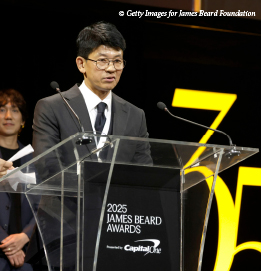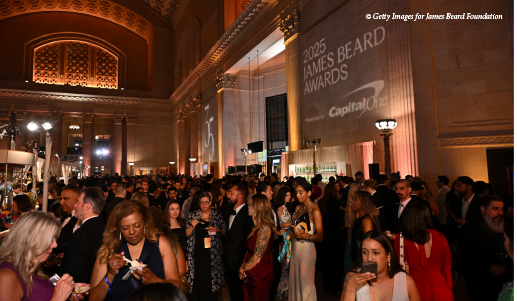Held at Chicago’s iconic Lyric Opera, the sold-out event welcomed almost 2,000 attendees and delivered a compelling message. The James Beard Foundation isn’t just handing out medals; it’s setting the compass for how the food world evolves.
A Foundation Rooted in Purpose
For decades, the James Beard Foundation has stood at the crossroads of culinary heritage and progress. Established in 1986 in memory of legendary cookbook author and teacher James Beard, the Foundation has grown into a national nonprofit focused on “Good Food for Good®.” Its initiatives span from leadership training and education to advocacy work, all with an emphasis on building a more equitable, sustainable, and culturally rich food ecosystem..
The annual Awards—first held in 1990—are the most visible expression of this mission. Over time, the categories have expanded to reflect the industry’s evolution, including new awards for beverage professionals and regional talent. But more importantly, the criteria have shifted to include the broader impact of the honorees: how they treat their teams, how they serve their communities, and how they contribute to a thriving, inclusive food culture.
As CEO Clare Reichenbach stated during this year’s ceremony, “These outstanding professionals are the epitome of Good Food for Good®, elevating our industry’s standards and redefining what’s possible in American cuisine.”
New York City at the Helm
Unsurprisingly, New York City left a significant mark this year.
Chef Jungsik Yim of Jungsik received Outstanding Chef, a milestone for modern Korean cuisine in America. Yim’s artistry reflects the global maturity of the city’s dining scene—fusing tradition with modernity in a way few chefs can replicate.
Atomix, a temple of sensory storytelling and hospitality in Manhattan, earned the Outstanding Hospitality honor. Atomix doesn’t just serve a meal—it crafts an experience. This award highlights the emotional intelligence and care that can turn dining into something transcendent.

Equally celebrated were Lee Hanson and Riad Nasr, the duo behind Frenchette, Le Veau d’Or, and Le Rock, who were honored as Outstanding Restaurateurs. With their keen eye for preserving classic French technique while making it feel refreshingly modern, they’ve built some of the most beloved establishments in the city.
Ignacio “Nacho” Jimenez, founder of East Village’s Superbueno, was named Outstanding Professional in Cocktail Service. Jimenez’s cocktails are more than beverages—they are expressions of culture and identity, spotlighting Mexican flavors in a sophisticated, entirely new format.
Across the Country, Stories of Impact
This year’s winners stretched from Tulsa to Providence, Phoenix to Portland, telling a wider and richer story about America’s food identity.
Phila Lorn, named Emerging Chef, is making waves at Mawn in Philadelphia, where his Cambodian-rooted dishes deliver deeply personal and culturally layered cuisine. Meanwhile, Bûcheron in Minneapolis—awarded Best New Restaurant—demonstrates that innovation is thriving well beyond the traditional coastal strongholds.
Pastry chef Cat Cox of Country Bird Bakery in Tulsa, Oklahoma won Outstanding Pastry Chef, while JinJu Patisserie in Portland, Oregon took home Outstanding Bakery. These wins reflect a surge of excellence in cities that often fly under the national radar.
Charleston in Baltimore was recognized for its Outstanding Wine and Other Beverages Program, celebrating beverage programs that pair storytelling and sourcing with hospitality.
Across the regions, Best Chef winners like Carlos Delgado in D.C., Sky Haneul Kim in Rhode Island, and Jake Howell in Nashville paint a diverse and forward-thinking portrait of leadership in American kitchens.

Honoring Tradition and Humanity
The America’s Classics awards continue to be among the most cherished recognitions. This year, recipients included institutions like Lem’s Bar-B-Q in Chicago, Dooky Chase in New Orleans, and Gaido’s in Galveston—places where food, family, and community are inseparable. These restaurants are not trend-driven; they are touchstones, reflecting the soul of their regions.
The Foundation also honored Toni Tipton-Martin with its Lifetime Achievement Award. A food journalist, historian, and author, Tipton-Martin has preserved and amplified African American culinary traditions through works like The Jemima Code and Jubilee. Her influence extends far beyond the written page—her work reshapes how we understand America’s culinary history.
Chad Houser, the recipient of the Humanitarian of the Year Award, represents the intersection of food and social justice. At Café Momentum in Dallas, Houser trains at-risk youth in culinary skills and life development. His model is now expanding to cities across the country, proving that a kitchen can be a classroom—and a lifeline.
A Foundation Shaping the Future
The James Beard Foundation continues to evolve in response to the food industry’s greatest challenges and possibilities. It no longer simply applauds those at the pinnacle of culinary craft—it champions those who redefine what that craft means.
That’s what makes these awards so powerful: they are not just about who’s serving the best plate. They are about who is shaping the most meaningful impact. From labor practices to environmental stewardship, from immigrant-owned businesses to community-driven innovation, the Awards signal a broader, deeper conversation about how we eat, who we celebrate, and why it matters.
The 2025 honorees weren’t just recognized for excellence—they were recognized for influence, for conscience, and for commitment to the greater good. Whether they helm fine-dining restaurants or community bakeries, each of them is contributing to a food culture that’s more vibrant, responsible, and representative than ever before.
And for New York, our hometown heroes continue to show that this city isn’t just the culinary capital—it’s where progress and palate meet in perfect harmony.
To learn more about the James Beard Foundation, please visit JamesBeard.org





